- Quick Read
- Deep Read ( 5 Min. )

Why is Christian Science in our name?
Our name is about honesty. The Monitor is owned by The Christian Science Church, and we’ve always been transparent about that.
The Church publishes the Monitor because it sees good journalism as vital to progress in the world. Since 1908, we’ve aimed “to injure no man, but to bless all mankind,” as our founder, Mary Baker Eddy, put it.
Here, you’ll find award-winning journalism not driven by commercial influences – a news organization that takes seriously its mission to uplift the world by seeking solutions and finding reasons for credible hope.
Explore values journalism About usIn Today’s Issue
- Democrats brace for impact from Mayor Adams indictment
- Today’s news briefs
- Ten years after 43 students disappeared, Mexican parents still seek the truth
- Congress uncovers major Secret Service failures
- Raffensperger: Election board ‘destroying voter confidence’ in Georgia
- Francis Ford Coppola spent $125 million on ‘Megalopolis.’ How is it?
- How ships can make green fuel, and natural winds are key to cooling a city
Monitor Daily Podcast
- Follow us:
- Apple Podcasts
- Spotify
- RSS Feed
- Download
TODAY’S INTRO
Eyes on a power surprise
Green hydrogen from seawater and scrap aluminum?
The best innovations help with two or more problems at once. They utilize what’s at hand. In today’s Points of Progress column we land on the work of researchers trying to create a clean option for maritime fuel, which is notoriously polluting.
Could the discovery decarbonize heavy industry, or power homes, as the global need for energy rises? We’ll see. But it’s a Monitor hallmark to note credible wins, even nascent ones. And the turning of ocean-going vessels into old-school settings for the future of power generation represents a step worth watching.
Share this article
Link copied.

Help fund Monitor journalism for $11/ month
Already a subscriber? Login

Monitor journalism changes lives because we open that too-small box that most people think they live in. We believe news can and should expand a sense of identity and possibility beyond narrow conventional expectations.
Our work isn't possible without your support.
Democrats brace for impact from Mayor Adams indictment
The corruption indictment against Mayor Eric Adams of New York City is a blow to Democrats right before the November elections. Could it have ripple effects on the presidential campaign or congressional races?
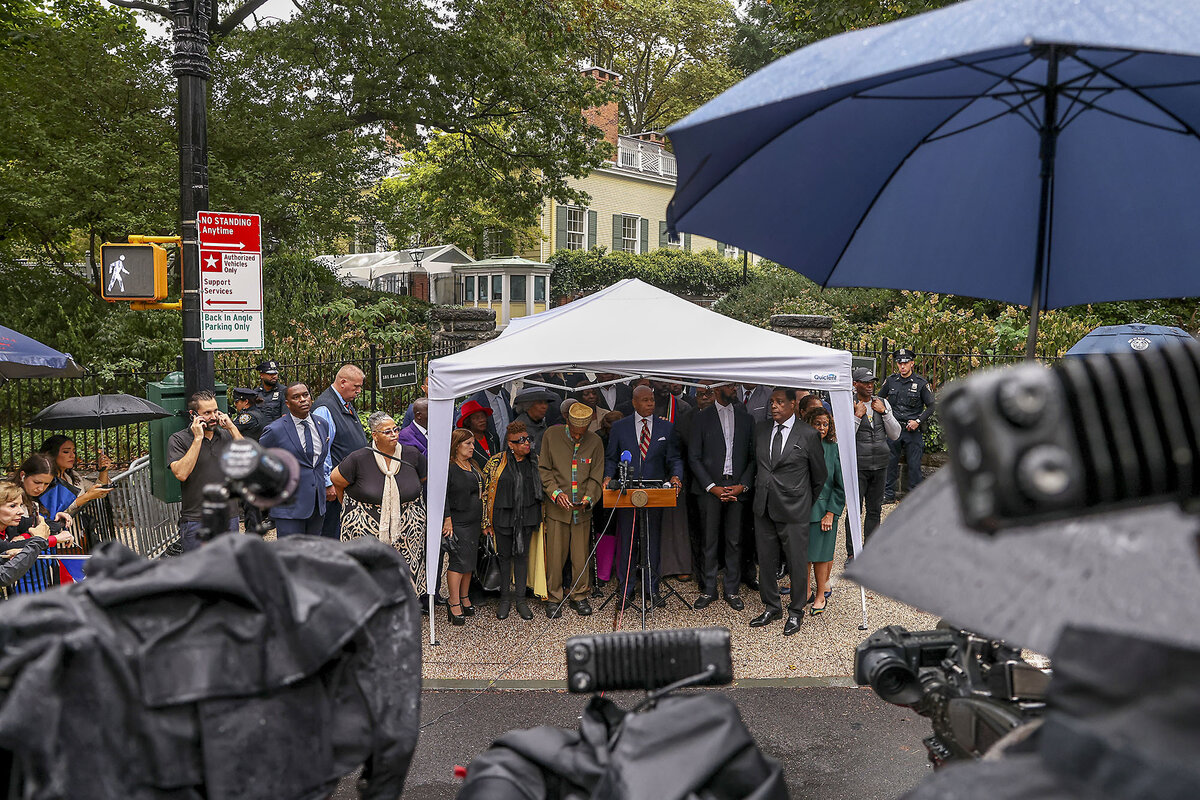
-
Hillary Chura Special contributor
The unsealed federal indictment on corruption charges Thursday against Eric Adams, New York City’s embattled Democratic mayor, has sent shock waves across the political universe – terrible optics for his party just weeks before the November elections.
But whether the indictment of Mayor Adams will affect the presidential race remains to be seen. Nationally, the smackdown between former President Donald Trump, the Republican nominee, and Vice President Kamala Harris, who emerged as Democratic nominee just weeks ago, has dominated discussion.
It may be that the drama in New York – the first-ever indictment of a sitting mayor in America’s largest city – remains a largely regional issue.
But even there, a local impact could have national implications. The race for control of the U.S. House, with Republicans holding a narrow majority, will hinge on a few races, with one of them on Long Island.
“Voters ... are not usually surprised by corruption in big-city politics,” says Democratic strategist Alex Navarro-McKay. But, he adds, news out of Manhattan could have “modest effects on the congressional races in the New York City media market.”
Mr. Navarro-McKay is referring to the 4th Congressional District race in Long Island, where GOP Rep. Anthony D’Esposito is under investigation for ethics violations.
Democrats brace for impact from Mayor Adams indictment
The unsealed federal indictment on corruption charges Thursday against Eric Adams, New York City’s embattled Democratic mayor, has sent shock waves across the political universe – terrible optics for his party just weeks before the November elections.
But whether the five-count indictment of Mayor Adams will affect the presidential race remains to be seen. Nationally, the epic smackdown between former President Donald Trump, the Republican nominee, and Vice President Kamala Harris, who emerged as Democratic nominee just weeks ago, has dominated discussion.
So it may be that the unprecedented drama in New York – the first-ever indictment of a sitting mayor in the Big Apple, America’s largest city – remains a largely regional issue.
But even there, a local impact could have national implications. The race for control of the U.S. House, with Republicans currently holding a narrow majority, will hinge on just a few races. One of them happens to be on Long Island.
“Voters across the country are not usually surprised by corruption in big-city politics,” says veteran New York Democratic strategist Alex Navarro-McKay. But, he adds, news out of Manhattan could have “very modest effects on the congressional races in the New York City media market.”
Mr. Navarro-McKay is referring to the closely contested 4th Congressional District race in Long Island, where GOP Rep. Anthony D’Esposito is under investigation for ethics violations.

The strategist says that while Republicans don’t seem bothered by former President Trump’s business fraud and sexual misconduct convictions in New York City, the legal troubles have made a dent with independent voters and some Democrats. But as for New York City’s mayor, he adds, “I don’t think voters in Michigan care about Eric Adams,” referring to a key presidential battleground state.
Corruption charges, and calls for Adams to resign
Republican strategists, too, aren’t sure how the Adams indictment will play out nationally. “We’re in uncharted territory,” says Doug Heye, a former communications director for the Republican National Committee.
But in New York City, the news was clearly devastating for Mr. Adams, a veteran of the New York Police Department and state Senate who took office Jan. 1, 2022. His mayoral campaign in 2021 surfaced questions about his ethics, including whether he even lived in New York City. But he won the race as a tough-on-crime former NYPD captain, though he was a longtime opponent of the police force’s stop-and-frisk practices.
By late 2023, Mr. Adams and his reelection campaign were under federal investigation for corrupt practices, including alleged illegal campaign donations from the Turkish government. In November of last year, the FBI seized the mayor’s electronic devices as part of its investigation.
Earlier this year, the walls began closing in on Mr. Adams, as the mayor himself, campaign officials, and New York City administration officials faced investigation and, in some cases, resigned. Others not under investigation stepped down, too, in a sign that the ship was sinking.

On Thursday, Damian Williams, the U.S. attorney in Manhattan, alleged in a press conference that Mr. Adams and his campaign had accepted more than $100,000 in illegal travel perks from the government of Turkey. The 57-page indictment described charges of bribery, wire fraud, and a conspiracy to receive illegal foreign campaign contributions.
Mr. Adams, in his own press conference outside the New York City mayoral residence, Gracie Mansion – which had been searched hours earlier by federal authorities – refused to step down. Democratic Gov. Kathy Hochul has the power to remove Mr. Adams from office, but held off on taking action Thursday, telling reporters that she was reviewing the charges.
Other prominent New York Democrats, including Rep. Alexandria Ocasio-Cortez, called on Mr. Adams to step down.
“I do not see how Mayor Adams can continue governing New York City,” Representative Ocasio-Cortez wrote on the social platform X. “The flood of resignations and vacancies are threatening gov function. Nonstop investigations will make it impossible to recruit and retain a qualified administration.”
“For the good of the city, he should resign,” she said.

Who would take over if Adams departs?
Questions swirled Thursday over who would take over for Mr. Adams if he were to resign. Normally, the city’s public advocate would replace a mayor who left office prematurely, but it is uncertain whether current the current public advocate, Jumaane Williams, would do so.
Mr. Williams, a progressive Democrat who has been critical of the mayor’s comparatively moderate stances on some issues, was elected public advocate for New York City in 2019 and reelected in 2021. He ran unsuccessfully for New York governor in 2022.
On Wednesday evening, before Mr. Adams was officially charged, Mr. Williams’ spokesperson posted on X that the news of the indictment was serious, and that the public advocate would say more as facts emerged. But Mr. Williams’ public appearances for Thursday were canceled. Neither Mr. Williams’ office nor Governor Hochul’s office responded to emails requesting comment.
Regarding the broader implications, one prominent Democratic New York strategist surmised that the impact of the Adams scandal would not go beyond the city’s metro area. Though even that could be impactful.
“It’s likely to be an issue in the suburban New York districts that could help determine the House majority,” said Lis Smith in a text. But other than that, she didn’t see the scandal having much of a national effect. “It’s a New York scandal through and through – not the first and definitely not the last!”
“And I would add that it’s gonna be tough for NY Republicans to weaponize it too much when they are all standing by Trump who was convicted of crimes,” she added. “It’s all very New York, very tawdry.”

Today’s news briefs
• Ukraine aid package: President Joe Biden announces more than $8 billion military assistance for Ukraine to help Kyiv “win this war” against Russian invaders, making the major commitment during a visit from President Volodymyr Zelenskyy.
• Helene bears down: Fast-moving Hurricane Helene advances across the Gulf of Mexico toward Florida. Forecasters say the storm is threatening a “catastrophic” storm surge in northwestern parts of Florida.
• Recruiting goals met: The U.S. Army, Air Force, Marine Corps, and Space Force are all on track to meet recruiting goals. The results reflect a slight uptick in young people joining the military, following several very difficult years and a swath of new programs and enticements. The Navy is the only service that won’t hit its goal this year, but it will come close.
• Editors sentenced: A Hong Kong court sentences former Stand News Editor-in-Chief Chung Pui-kuen to 21 months in prison in a sedition case seen as an indicator of waning media freedom in the city. Another editor was freed after his sentence was reduced.
• Mexico snubs Spanish king: A fight dating back more than five centuries reemerges as Mexico’s incoming president defends a decision to not invite the Spanish king to her inauguration after the monarch declined to apologize for colonial-era abuses.

A deeper look
Ten years after 43 students disappeared, Mexican parents still seek the truth
Protests usually express opposition. But in Mexico, where parents of disappeared students have marched for 10 years, grief has fueled a social movement that is more powerful than dissent.
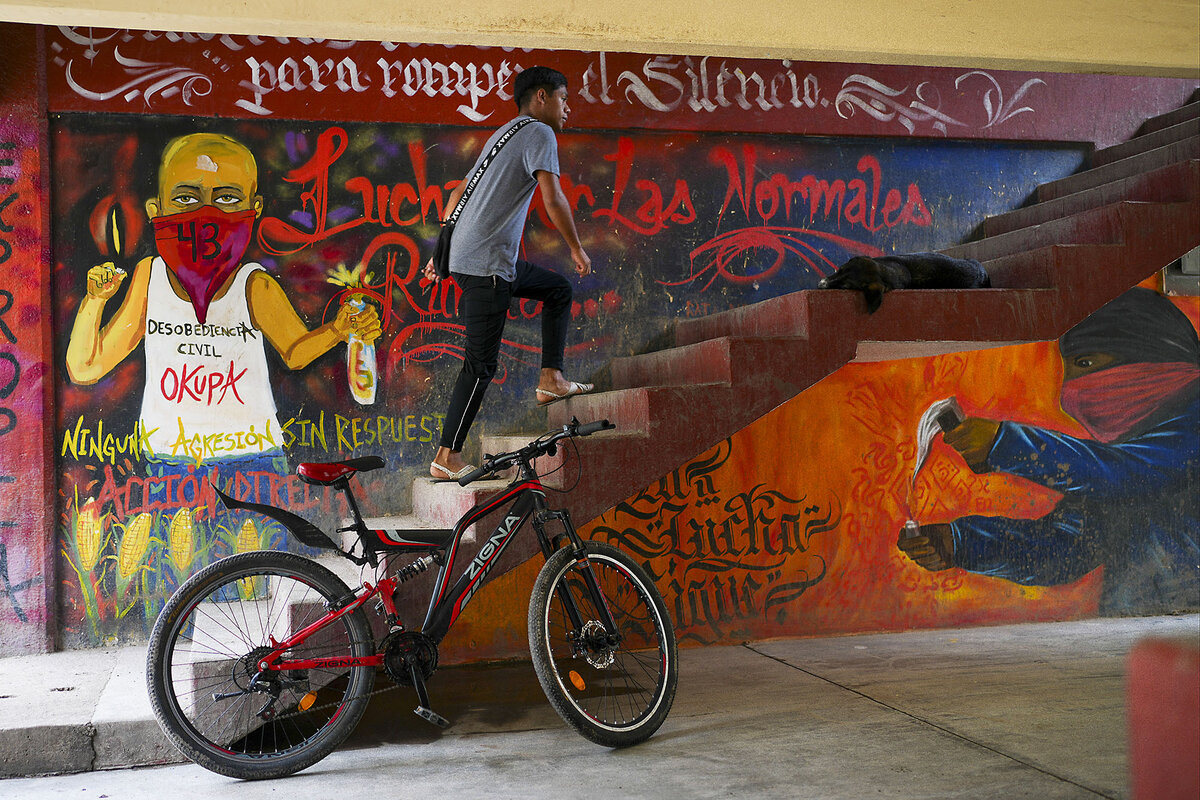
- Quick Read
- Deep Read ( 8 Min. )
On Sept. 26, 2014, a group of 43 young, aspiring teachers was attacked and vanished in the southern Mexican state of Guerrero. In a country well known for its “disappeared,” whose numbers have grown along with record-high violence, this crime was so brazen it made the name of the remote, rural locale of Ayotzinapa, where the young men had been studying, globally recognizable.
As Mexico marks the 10th anniversary of a tragedy many hoped could change the nation – in how justice is meted out, how the government treats victims of violence, and how far violence is tolerated – the families of the students have little certainty about what unfolded that night and who, specifically, should be held responsible.
The Mexican state under two presidents with vastly different ideological bents has doubled down to protect the armed forces and to sideline victims and their families, experts say, showing an unwillingness to get to the truth. But the tireless march of families of the disappeared has fueled a growing social movement powered not by political opposition but by grief that has captured the nation’s attention.
There have been “more expressions [of resistance] not only by the families of these students, but others whose loved ones have disappeared in this country,” says one human rights advocate.
Ten years after 43 students disappeared, Mexican parents still seek the truth
Bernabé Abraham Gaspar’s son disappeared 10 years ago.
So as he has done on the 26th of nearly every month since, he adjusts his huarache sandals and finds his place on the main thoroughfare of Mexico City. In the shadow of the capital’s golden Angel of Independence, ominous gray clouds above Mr. Abraham split apart, letting the sun peek out as he and dozens of parents begin their long march, clutching pictures of their beloved sons, their faces frozen in time.
On Sept. 26, 2014, a group of 43 young, aspiring teachers was attacked and vanished in the southern Mexican state of Guerrero. In a country well known for its “disappeared,” whose numbers have grown along with record-high violence, this crime was so brazen it made the name of the remote, rural locale of Ayotzinapa, where the young men had been studying, globally recognizable.
But as Mexico marks the 10th anniversary of a tragedy many hoped could change the nation – in how justice is meted out, how the government treats victims of violence, and how far violence is tolerated – the families of the students have little certainty about what unfolded that night and who, specifically, should be held responsible.

The Mexican state has doubled down to protect the armed forces and to sideline victims and their families, experts say, showing an unwillingness to get to the truth. But the tireless march of parents like Mr. Abraham has helped fuel a growing social movement powered not by political opposition, but by grief that has captured a society’s attention.
There have been “more expressions [of resistance] not only by the families of these students, but others whose loved ones have disappeared in this country,” says María Luisa Aguilar Rodríguez, a coordinator at the Center for Human Rights Miguel Agustín Pro Juárez A.C. (Centro Prodh), a human rights organization in the capital that helps the families of the 43. “They’re making clear to the world the failures of our institutions.”
As Mr. Abraham, whose son Adán was 24 years old when he disappeared, puts it, “If we stop coming [to protest], the government will say, ‘This doesn’t matter to us.’”
So he marches forward.
Establishing facts
The Raúl Isidro Burgos Rural Normal School in Ayotzinapa, where the young men were studying, is part of a network of teacher-training colleges that expanded after the Mexican Revolution in the early 1900s to bring education to rural areas. Over time, the schools became deeply involved with social issues such as land rights that have given them a reputation for radical activism.
One annual tradition at the Ayotzinapa teachers college was to commandeer buses to transport the students about 250 miles to Mexico City for an annual march commemorating a massacre of college students by the military in 1968.

But en route, police forced dozens of students off the buses they were riding. Six people, including three students, were killed in a confrontation that night, and 43 students vanished.
Soon after, the government of then-President Enrique Peña Nieto announced that the case had been solved and declared what it called the “historic truth.” It concluded that the men had been handed off by the police to local gang members who had taken them to a nearby trash dump, where their bodies were incinerated.
The parents never accepted that this was the truth, however, and began a four-year search for more answers, says Humberto Guerrero Rosales, the human rights program coordinator at Fundar, a Mexico City think tank that focuses on transparency.
And then, unexpectedly, came a ray of hope.
President Andrés Manuel López Obrador was elected in 2018, riding to power on his folksy, leftist rhetoric that for the first time in modern memory seemed to speak directly to Mexico’s long-ignored poor population. Early on, he set up a truth and justice commission for Ayotzinapa and appointed a special prosecutor for the case.
“My promise is not to fail the mothers [and] the fathers of the young people of Ayotzinapa, the people of Mexico,” said Mr. López Obrador in September 2018.
In 2022, the truth commission concluded what the families had believed from the start: The Ayotzinapa tragedy was a “crime of the state” involving police officers, government officials, and the military, along with a local drug trafficking gang. It debunked the story that the students’ bodies had been burned at a dump.
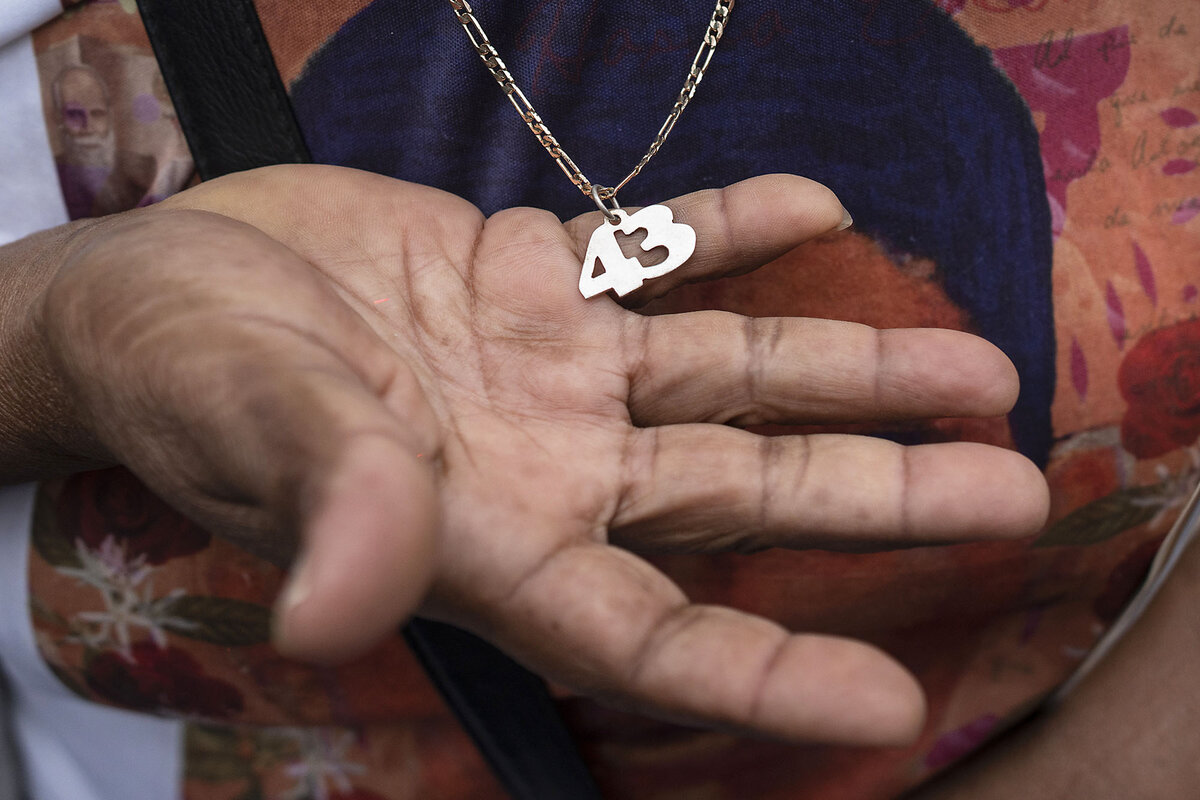
But by 2023, that sense of hope for the truth dimmed.
“The moment responsibility started to be assigned to the army, that’s where things started to fall apart,” says Mr. Guerrero, the human rights activist. The armed forces have played a central role in Mr. López Obrador’s administration, often carrying out traditionally civilian tasks such as building infrastructure, controlling migration, and even working in tourism.
“We have a president who basically denounced the work carried out by his close collaborators and closed ranks to defend the army and deny its participation,” Mr. Guerrero says. “The version of the narrative the government is now pushing has similarities to that initial ‘historic truth.’ The disappearances of the students was part of a local problem, specific to the state of Guerrero.”
Changing course
The government reverted to the previous administration’s attitude to the parents. They found themselves lumped into a broad group of actors President López Obrador felt were undermining his transformation of the country: the opposition.
The president “gave us hope that he would dedicate resources to this. That our pain wasn’t nothing. But then he did nothing,” says Calixta Valerio, whose son Mauricio Ortega Valerio was 18 years old when he disappeared alongside his classmates. He had grown up playing make-believe with his younger sisters, always taking the role of teacher, his mother recalls.
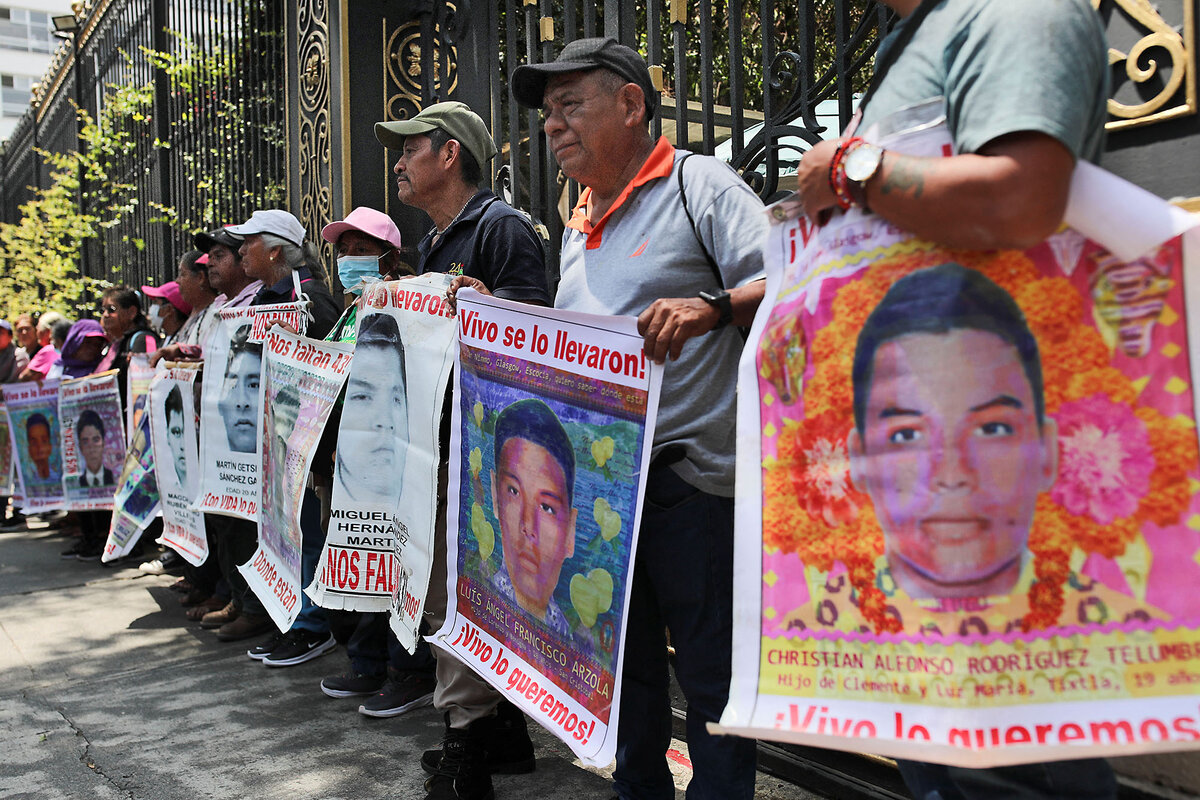
In December 2023, Mr. López Obrador changed the way in which the country’s disappeared were counted, reducing the number by 90% in one fell swoop, from 110,964 to 12,377. This was a slap in the face for those tirelessly searching for their missing loved ones, made worse when government agencies involved in the search for disappeared people saw their budgets cut.
“Disappearances” are not just a matter of widespread violence in certain parts of Mexico, says Ms. Aguilar from Centro Prodh. They happen “because none of those areas have installed the capabilities to carry out an investigation or criminal prosecution,” she says. “As long as no one investigates it, it continues.”
And the government has forgotten that the families of disappeared people in Mexico are not just another social movement, but victims, too, she adds.
“If the government understood them as victims, they would understand that for them it is impossible not to fight the state,” she says. “So, unlike other social movements, small steps or concessions won’t necessarily satisfy them. They aren’t the opposition; they are demanding support to find a loved one.”

Joining forces
Between 2007 and April 2023, the government identified more than 5,500 clandestine graves in Mexico, some of them holding multiple bodies. More than half of these mass burial sites are in just three states, including Guerrero.
The disappeared in Mexico tend to be young and poor, the same demographic around which Mr. López Obrador has centered his policies to end historic economic inequality.
Over the past 10 years, while the Ayotzinapa case has been drawn out on the public stage, families of other disappeared people have prominently organized in states across Mexico to take justice into their own hands. Groups like the “Searching Mothers of Sonora” and “The Network of Disappeared Persons in Tamaulipas” are proliferating, acting on anonymous tips and facing threats from criminal organizations in their hunt for answers that the authorities have not made a priority.
“I find hope in how victims and families are organizing,” says Mr. Guerrero. “Even victims from 50 years ago, victims of state terrorism in the 1970s, they still have the energy and imagination to create waves, to organize.”
Ayotzinapa family members met President-elect Claudia Sheinbaum Pardo in late July, but they have mixed feelings about what to expect from her once she takes office Oct. 1. Some say they worry her administration will offer more of the same, while others hold out hope she will recognize that Ayotzinapa created a clear “before and after” for disappearances in Mexico, and take concrete action.
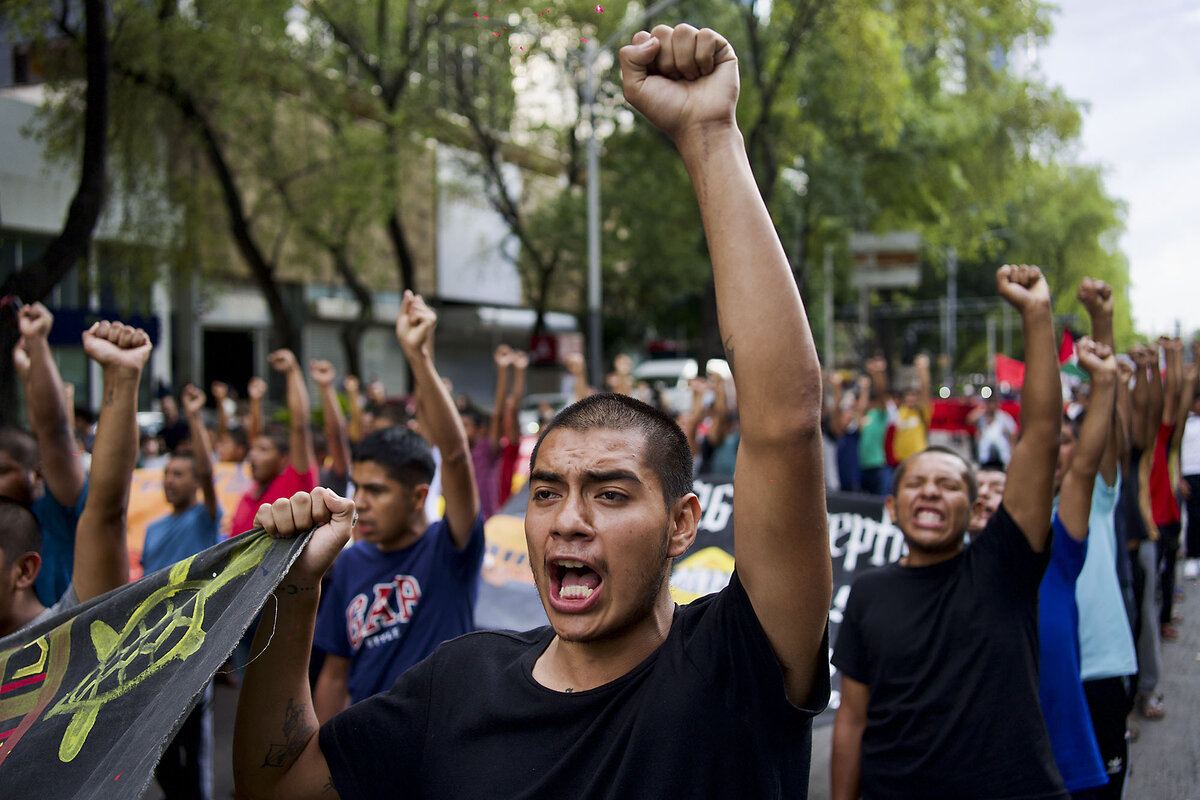
It’s a pivot point that’s clearly marked on the streets. At the recent monthly Mexico City protest, the last before the 10th anniversary, scores of current students from the Ayotzinapa teachers college marched in tight rows, screaming so loudly their words were indecipherable.
Behind them followed a wave of teachers groups, Indigenous collectives, and a trio of drummers. Another group of demonstrators counted solemnly to 43 as they walked the route.
The parents and their supporters wove their way down the street through a roundabout dedicated to the nation’s disappeared, printouts of hundreds of faces glued to a temporary barricade. A half-mile later, they passed a roundabout dedicated to missing and murdered women.
“We first said we’ll go and march for eight days. Then 15 days, we’d protest,” says Macedonia Torres Romero, whose 18-year-old son José Luis Luna Torres was among the disappeared. “Now it’s 10 years we’ve been marching,” she says, holding up a banner with the boyish face of José Luis, who would be in his late 20s now.
“We’ll fight until the end. That’s what it means to be a parent,” she says, her T-shirt underlining the point: “Son, I’ll search until I find you.”

Congress uncovers major Secret Service failures
Key details are emerging from both a House hearing and a Senate report on Secret Service lapses in security for presidential candidates. A bipartisan effort in Congress aims to identify and fix systemic problems.

- Quick Read
- Deep Read ( 6 Min. )
-
Caitlin Babcock Staff writer
Despite heightened partisan tensions heading into a consequential election, Congress has put aside its usual divisive rhetoric to investigate the dual Trump assassination attempts in a serious, bipartisan way.
A House panel held its first hearing Thursday. Members of local law enforcement who were working at the Butler, Pennsylvania, site when former President Donald Trump was shot and nearly killed on July 13 helped lawmakers piece together a series of failures in planning, coordination, and communications.
The overall thrust of their testimony corroborated an interim Senate report released Wednesday that found “foreseeable, preventable” failures.
These congressional investigations aim to uncover not only what went wrong but also any systemic reasons for such mistakes.
Untangling such problems, some due to chronic understaffing as well as increased operational demands on the Secret Service, will take time. But both the agency and lawmakers recognize the need to act immediately to prevent a potentially explosive act of violence so close to Election Day.
“We must be united in our belief as Americans – not as Republicans or Democrats – that political disagreement is settled through rigorous debate, not violence,” said Rep. Jason Crow of Colorado, the top Democrat on the House panel.
Congress uncovers major Secret Service failures
Despite heightened partisan tensions heading into a consequential election, Congress has put aside its usual divisive rhetoric to investigate the dual Trump assassination attempts in a serious, bipartisan way.
“We must be united in our belief as Americans – not as Republicans or Democrats – that political disagreement is settled through rigorous debate, not violence,” said Rep. Jason Crow of Colorado, a retired Army Ranger and the top Democrat on a bipartisan House panel that held its first hearing Thursday. “This task force has a solemn, urgent responsibility to uncover the failures and help stop them from being repeated.”
At the hearing, members of local law enforcement who were working at the Butler, Pennsylvania, site when former President Donald Trump was shot and nearly killed on July 13 helped lawmakers piece together a series of failures in planning, coordination, and communications. The overall thrust of their testimony corroborated an interim Senate report released Wednesday that found “foreseeable, preventable” failures.
Both the House and Senate investigations have expanded to include a second apparent assassination attempt on Mr. Trump in Florida earlier this month, underscoring the urgency as he and Vice President Kamala Harris step up their appearances in the final weeks of the campaign.
These congressional investigations aim to uncover not only what went wrong but also any systemic reasons for such mistakes, including an apparent lack of accountability and responsibility. Untangling such systemic problems, some due to chronic understaffing as well as increased operational demands on the Secret Service, will take time. But both the agency and lawmakers recognize the need to act immediately to address the risk of violence close to Election Day.
“In this next phase we will be seeking answers about the Secret Service’s questionable decisions regarding planning, resources, and the apparent lack of leadership that led to complacency and vulnerability on July 13,” said House task force Chair Mike Kelly, a Pennsylvania Republican who grew up in Butler.

Among the more stunning failures identified by the Senate report, which is based on 2,800 pages of documents and a dozen transcribed interviews with U.S. Secret Service personnel:
- A Pennsylvania State Police lieutenant involved in a planning meeting on site five days before the rally said the U.S. Secret Service couldn’t answer basic questions, including where the stage would be.
- Countersnipers, which had not previously been used for presidential candidates who were not yet official nominees of their party, were added to the security plan due to credible intelligence of a threat, relayed by Mr. Trump’s detail, but the Secret Service’s special agent in charge of the rally was never notified of that threat.
- Not only were the Secret Service and local law enforcement communicating on separate radio frequencies, but their communications teams were operating out of separate locations more than 100 yards apart. That is an unusual departure from the norm of a single unified command center, and hampered quick sharing of information.
- The Secret Service agent running a system for countering drones, which the shooter used to surveil the area, only had about three months of experience using that equipment. When technical problems arose, he had to call a toll-free 888 hotline, delaying deployment of the system.
Mr. Trump, who is scheduled to return to the same Butler site for another rally next weekend, was warned earlier this week in a briefing with the Office of the Director of National Intelligence that Iran is behind real and specific threats to assassinate him “to destabilize and sow chaos in the United States.”
Some members of the House task force suggested a connection between the July 13 shooting and the July 12 arrest of Asif Merchant, a Pakistani with ties to Iran who had made $5,000 payments to individuals who would carry out an assassination.
Two weeks ago, the Department of Justice indicted Mr. Merchant “with attempting to commit an act of terrorism transcending national boundaries and murder-for-hire as part of a scheme to assassinate a politician or U.S. government official on U.S. soil” – a move FBI Director Christopher Wray said was “straight out of the Iranian regime’s playbook.” However, the FBI told the Senate committee that Mr. Merchant had no connection to the July 13 Trump assassination attempt.

Crucial communication breakdown
Representative Crow framed perhaps the most crucial issue going forward: the need for better coordination and clearer lines of communication between Secret Service agents and their partners at protective events.
The agency, which is responsible for protecting the family – including grandchildren – of presidents and former presidents, has been increasingly stretched thin, due in part to the multigenerational Biden and Trump families. Therefore, the agency is increasingly dependent on local, state, and federal partners.
A summary of the Secret Service’s initial “mission assurance” report, released to answer questions about its performance on July 13, noted an uptick in operational demands and an increasingly stretched staff as one of several potential contributing factors to mission failure.
“A central tenet of law enforcement operations is effective communications,” the report said, noting breakdowns in those communications at the rally. It noted that Mr. Trump’s protective detail “were not apprised of how focused state and local law enforcement were in the minutes leading up to the attack on locating the suspicious subject.”
The interim Senate report released this week noted that while the Secret Service had acknowledged its failure as an agency, no one individual had taken responsibility. It revealed that many of the mistakes that enabled Thomas Matthew Crooks to get up on a roof with a clear line of sight to Mr. Trump were due to a lack of clarity about the lines of responsibility between the Secret Service and its partners.
Mr. Crooks, who had been roaming the grounds for hours before the shooting, fired eight shots toward the stage at 6:11 p.m., killing a rallygoer and coming within less than an inch of a fatal shot to the former president’s head.
Why the now-infamous roof was not better protected
The most significant failure involved a lack of planning and coordination between the Secret Service and local law enforcement over the American Glass Research building, from whose roof the shooter targeted Mr. Trump.
According to the Senate report, Secret Service agents did not review local law enforcement’s plans for covering the building from which a gunman shot Mr. Trump at the rally, and did not sweep it before the rally.

While the acting director of the Secret Service told the Senate Homeland Security committee in a July 30 hearing that local snipers positioned inside the building could have seen the shooter, one of those snipers said he would have had to have been “hanging out the window” to do so. No agents were posted on the roof.
Some of the Secret Service countersnipers assigned to monitor the roof of that building, including the one who fired at the shooter, had a partially obscured view of the roof – a point that the lead of their team said he “didn’t really make a mental note of” when he previewed the area, and did not mention to the countersnipers.
Another countersniper team had a clear line of sight, but spent most of the rally facing a different direction. So while Mr. Crooks was spotted by local police and even by some rally attendees, none of the Secret Service countersnipers interviewed so far were aware of his presence until seconds before shots were fired.
That said, at least eight other Secret Service agents were aware of Mr. Crooks 19 minutes before the shooting, but they failed to communicate and take action before he shot Mr. Trump.
Majority of documents heavily redacted
The Senate Committee on Homeland Security said that many of its requests to the Secret Service for documents have not been completed, and that the majority of documents handed over have been heavily redacted.
In a letter to the Secret Service’s acting Director Ronald Rowe on Sept. 11, four members of the committee expressed concern to the agency over its lack of cooperation, adding that the agency would sometimes delay producing the necessary documents until just minutes before a scheduled interview.
The FBI, for its part, has provided 27 pages of documents so far.

Interview
Raffensperger: Election board ‘destroying voter confidence’ in Georgia
While reporting on state-level preparations for the coming election, our reporter sat down with Georgia’s Republican secretary of state. In the interview, Brad Raffensperger warns that last-minute rule changes by the state’s right-wing election board are undermining prospects for a smooth ballot count. Voter trust and election integrity are at stake.

- Quick Read
- Deep Read ( 7 Min. )
Georgia’s Republican secretary of state is warning that last-minute election rule changes implemented by his state’s election board are creating unnecessary confusion and undermining voter trust in one of the United States’ most hotly contested presidential battlegrounds.
Republican Brad Raffensperger famously declined to grant then-President Donald Trump’s demand that he “find 11,780 votes” to reverse his 2020 loss in the state. He’s since backed controversial voting law changes decried by Democrats, defeated a Trump-backed primary challenger in 2022, and crisscrossed the state trying to convince voters that his state’s elections will be safer and more secure than ever before, including changes he says should ensure a smooth vote count.
But a hard-right majority gained control of Georgia’s State Election Board in May. In recent weeks that board has passed controversial rule changes. Just days ago, it approved a new rule requiring all ballots be counted by hand to make sure they match machine counts, a time-consuming and error-prone process that could delay the tabulation of votes on election night.
The Monitor sat down with Secretary of State Raffensperger in his office in the Georgia state Capitol in Atlanta on Tuesday afternoon to talk about his work and his concerns about the board.
Raffensperger: Election board ‘destroying voter confidence’ in Georgia

Georgia’s Republican secretary of state is sounding the alarm that last-minute election rule changes implemented by his state’s election board are creating unnecessary confusion and undermining voter trust in one of the United States’ most hotly contested presidential battlegrounds.
Republican Brad Raffensperger famously declined to grant then-President Donald Trump’s demand that he “find 11,780 votes” to reverse his 2020 loss in the state, facing death threats as he refused to succumb to pressure from the president. He’s since backed controversial voting law changes decried by Democrats, defeated a Trump-backed primary challenger in 2022, and crisscrossed the state trying to convince Georgia voters that his state’s elections will be safer and more secure than ever before, while implementing changes he says should ensure a smooth vote count this fall.
But a hard-right majority gained control of Georgia’s State Election Board in May. In recent weeks that board, led by that trio of Republican-appointed officials, has passed a bevy of controversial rule changes. They include rules that would seemingly give local election board members wide leeway to conduct “reasonable inquiry” into any perceived problems with the voting process, and potentially toss out votes. Just days ago, they approved a new rule requiring all ballots be counted by hand to make sure they match machine counts, a time-consuming and error-prone process that could delay the tabulation of votes on election night. Mr. Trump praised the trio in a speech in Georgia last month, calling them “pit bulls fighting for honesty, transparency, and victory.”
The Monitor sat down with Secretary of State Raffensperger in his office in the Georgia state Capitol in Atlanta on Tuesday afternoon to talk about his work and his concerns about the board.
Here’s what he had to say about the looming elections. The transcript has been condensed and edited for clarity.
Do you feel like the members who make up the majority governing Georgia’s State Election Board understand how elections work?
No, I don’t think they do. And the only way to understand how elections work is to volunteer to be a poll worker. It’s as easy as that. Once you’ve worked one election, you start understanding, “Oh, they’ve got this procedure to close that gate [to potential voting fraud].”
These people don’t know what to look for. So any great conspiracy theory they hear, they buy into it.
Do you think these election board members are operating in bad faith?
(Mr. Raffensperger pauses for nine seconds.)
That’s a long pause.
I think they’re living in the past. They’re fighting the wrong battle, because we’ve already [responded to] many of these concerns that everyone had. The ballot storage boxes now are defined where they’ll be and how many there’ll be per county. You got one for every 100,000 voters. We also now have voter ID.
All the early voting [now] has to be reported no later than one hour after polls close, so 8 p.m.
So all you’re waiting for now is the 30% to 35% that could have been cast on Election Day. And we want to make sure we have constant updates from the counties.
Everything that they’ve done with their rules and regulations slows down the process. We’re serious when we say “free, fair, and fast.” And what they’re doing is just throwing a wrench into the works.
How big a wrench do you think this is? What sort of delay might we be looking at for reporting results?
The counties have already expressed how long they think it’ll take. It could be 1 o’clock to 4 o’clock [a.m.]. But once one starts getting to 3 or 4 o’clock, that’s the triple witching hour. “Oh, is this the same thing that happened in Philadelphia in 2020, in Detroit in 2020?” Everything we’ve done is to shore up voters’ confidence – and everything that they’re doing is destroying voter confidence.
It’s just a breeding ground for conspiracy theories.
Some of the new rules the State Election Board just passed would seemingly give local officials wide leeway to toss ballots if they claim errors occurred in voting or tabulation. And counties can conduct a “reasonable inquiry” before certifying results. What impact could that have if these rules stand?
At the end of the day, state law is very clear, and that cannot be violated. All elections must be certified the Monday after the election. Because [this year] Monday is Veterans Day, they get till Tuesday, they get that extra day. But that’s it. That’s black-letter law, and everyone has to follow state law. You have to follow the state constitution.
What if some counties meet the certification deadline but also, say, decide to throw out an entire precinct’s votes because they have questions about it?
That’s when other people will be involved. I’m sure the candidates will be filing suits along with other nonprofits and other nonpartisan groups to make sure that they do follow the law.
Which of the new rules are you most concerned about?
Every one of them oversteps what is already in state law. We think that a court will find that they’re null and void.
The [Republican] attorney general, in a six-page letter of advisement, laid it all out. We had a two-page letter. But they’re bound and determined to do what they want to do.
You spent the past four years working to try and make sure that this post-election period would not look like what we saw in 2020. How much will the election board’s new rules undermine that effort?
What they’re doing is actually very detrimental. Because [a winning candidate will say] “I won in spite of all the stuff that you guys were doing to us,” and if the candidate loses, “Well, you know, the rules disfavored me.” And so it’s not helpful for the republic.
People need to understand, and particularly conservatives need to understand: Georgia is ranked by The Heritage Foundation, a hard-right think tank, No. 2 for election integrity. Can I say that again? We are ranked No. 2 by The Heritage Foundation. I’m sure they probably got blowback from a lot of people, saying, “How is that possible?” Because they did their work.
They looked at all our processes and our procedures and our laws. I was the first secretary of state, over 1 1/2 years ago, doing a citizenship verification of our voter rolls before anyone was even talking about it.
I was the first one that jumped on that, because I saw with our open borders that voters were going to be concerned about that. Rightly so. So, we did a check. We found [1,634 people] who attempted to register but were not put on the voter list because they couldn’t verify their citizenship. Once they show that they’ve been naturalized, they show that documentation, they will go back on [the registered voter list] – but they haven’t [yet]. And they haven’t voted because they’re not on the list. And I think that should give voters great comfort.
We know that these are lawful Georgian voters voting in our elections.
You backed Senate Bill 202, which gave the election board some new powers and put in place a litany of other controversial voting changes backed by Republicans in 2021. Do you regret supporting that law?
Well, I didn’t support removing me as chair of the State Election Board.
Fair, but you supported the bill overall.
Overall, I thought it was great, because I wanted to make sure that we could identify our absentee voters. When I ran, back in 2018, I said, as an engineer, that signature match looks awfully subjective. Guess who else thought it was subjective? Democrats and Republicans. We actually got sued by both of them. Now we use driver’s licenses, just like Minnesota, Kansas, Nebraska.
Former President Donald Trump has repeatedly called you out. You faced death threats after the 2020 election. Are you still getting threats?
Not recently. It’s been a while.
Are you worried about threats of violence in the run-up to and after this election, and what are you doing to lower those risks?
I believe we’ll have secure elections during Election Day. We’ve been doing regional tabletops with law enforcement, security game-planning, scenario, strategies. We also have given local precinct managers a texting tool, “See Something, Say Something,” so they can alert. It comes to us, goes with the local county sheriff and also the election director. We also have lanyards with a press-button [to call] 911. We also want to have the local deputy sheriffs with their vehicles at the precincts. That’s 2,400 precincts – that’s a lot of cars, but it lets you know, “Hey folks, you know, let’s keep it quiet.”
Will you vote for former President Trump this election?
I don’t endorse anyone, and the reason I don’t is I’m the chief election official here in the state of Georgia. We don’t want any county election official spouting out who they support. Do your job.
Do you think we’ll see the level of post-election chaos after this election we saw after 2020?
There’s no way to predict, but our job is to be prepared for any kind of outcome at the end of the day.

On Film
Francis Ford Coppola spent $125 million on ‘Megalopolis.’ How is it?
“Godfather” director Francis Ford Coppola waited 40 years to make his passion project. After seeing it, the Monitor’s film critic wonders, “What in tarnation has he wrought?”

Francis Ford Coppola spent $125 million on ‘Megalopolis.’ How is it?
Francis Ford Coppola’s long-awaited “Megalopolis,” set in the futuristic city of New Rome, is the movie he’s been wanting to make for 40 years. Now that he’s finally written and directed it, what in tarnation has he wrought?
The narrative, such as it is, loosely derives from the Catiline conspiracy of 63 B.C., when the aristocrat Lucius Sergius Catilina failed in his attempt to overthrow the Roman consul Marcus Tullius Cicero.
In Coppola’s version, Catilina has become Cesar Catilina (Adam Driver), a visionary Nobel Prize-winning scientist-architect obsessed with rebuilding the urban blighted New Rome as a sustainable utopia. His primary building block is “megadon,” a substance he created that allows him to control space and time. His nemesis is Franklyn Cicero (Giancarlo Esposito), New Rome’s mayor, a status quo kind of guy. Ostensibly it’s a tradition versus progress fable.
In actuality, it’s a movie furiously, perhaps intentionally, at odds with itself. Coppola’s Catilina may represent a resplendent avatar of a utopian future – a cross between Iron Man and Howard Roark, the uncompromising architect from Ayn Rand’s “The Fountainhead.” But he’s also a self-obsessed megalomaniac who has possibly poisoned his wife. His greatest goal, aside from saving mankind, is to stop time – i.e., cheat death.
Despite the film’s bias against Cicero, his embattled resistance to Catilina doesn’t appear altogether baseless or unreasonable. After all, the New Rome he presides over – which at times resembles one big toga party – doesn’t seem a whole lot more dystopian than the supposedly glorious city Catilina envisions.
One of the film’s central deficiencies is that Coppola never convincingly shows us those glories. It’s a visionary movie without a vision. Or perhaps there are simply too many visions, all elbowing for center stage in Coppola’s rowdy bacchanal.
At times the film resembles a cross between “Blade Runner” and “Caligula.” Maybe it will become this era’s head-trip movie the way “2001” and “Fantasia” functioned for earlier generations.
But it’s difficult to bliss out on a movie so clamorous. Coppola, a past master at directing actors, allows his performers – who include Dustin Hoffman, Jon Voight, Aubrey Plaza, and Nathalie Emmanuel – to shamelessly ham it up. Laurence Fishburne, playing the film’s ostensible fount of wisdom, intones weighty lines like “Such are the difficulties of the human heart.” Catilina recites Hamlet’s “To be, or not to be” soliloquy. We’re treated to clunkily staged orgies, prancing vestal virgins, glancing references to the rise of Hitler and Mussolini – all in the service, I suppose, of the thesis that empires fall to fascism through moral decay.
Is Coppola drawing some sort of analogy between the world we live in and New Rome? And is the genius-visionary Cesar Catilina, with all his torments and aberrations, somehow meant to be a stand-in for Coppola himself? Coppola self-financed this $125 million dollar movie because he wanted to exert complete artistic control. Alas, what ran through my mind while watching is: Be careful what you wish for.
And yet, to my surprise, I did take away something that has stayed with me and even moved me. Years ago, at the time of “One From the Heart,” I wrote of Coppola: “He’s cast himself as an innovator – a visionary – and yet his great work has been solidly grounded in the old-fashioned narrative tradition.” In “Megalopolis” the director of two of the finest films ever made – the first two “Godfather” movies – is still miscasting himself as an innovator.
But innovation isn’t everything. Setting aside my reservations, I choose to read the film as Coppola’s encoded meditation on his own mortality. Like his flawed hero Catilina, he wants to stop time. At 85 years old, having not directed a film in over a decade, he has at last made his passion project. I wish I liked “Megalopolis” much more than I did, but, in the end, that may not really matter. A great artist is entitled to his grand follies.
Peter Rainer is the Monitor’s film critic. “Megalopolis” is rated R for sexual content, nudity, drug use, language and some violence.

Points of Progress
How ships can make green fuel, and natural winds are key to cooling a city
In our progress roundup, scientists used resources close at hand to come up with new climate adaptation and mitigation solutions. Plus, three short reports on equality and justice from South Africa, Brazil, and Nepal.
How ships can make green fuel, and natural winds are key to cooling a city
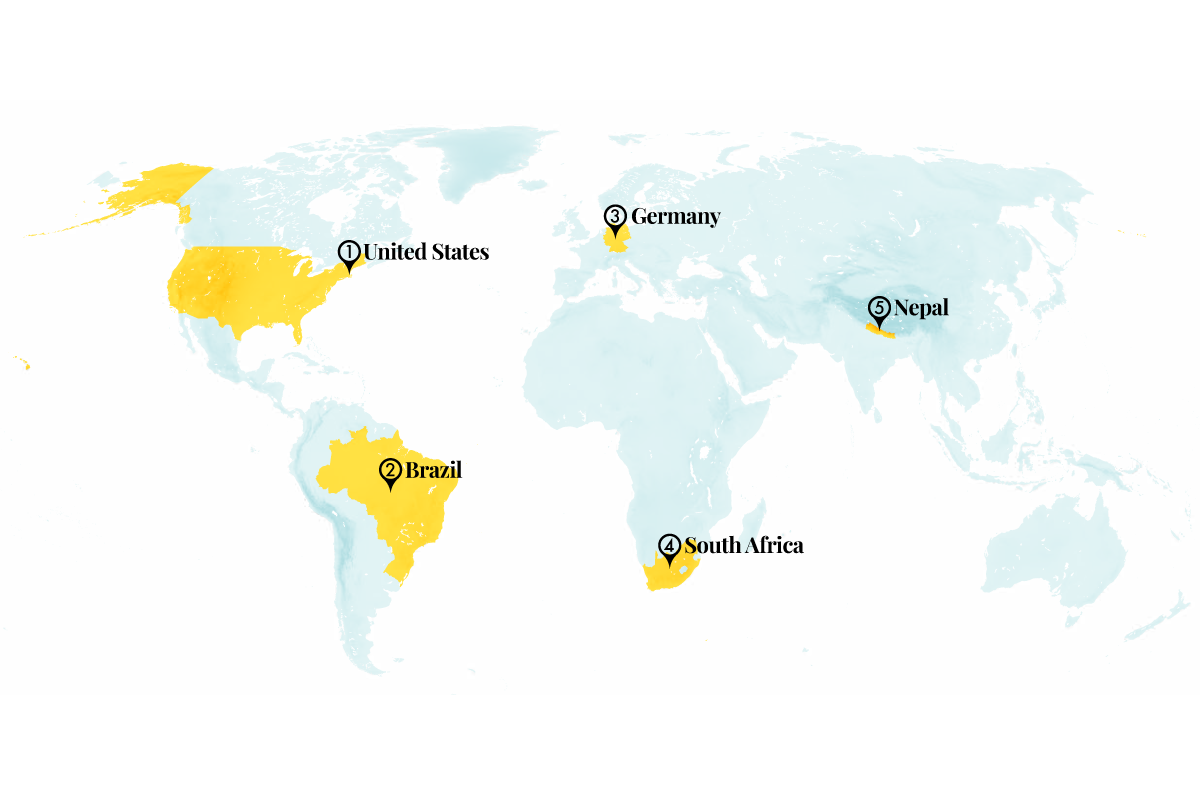
Caffeine speeds up a reaction with aluminum in seawater to produce hydrogen fuel
Described in a research paper, the discovery helps engineers who are developing a reactor that could run a waterborne vessel with clean energy.
Researchers at the Massachusetts Institute of Technology dropped small aluminum pellets, treated with a gallium-indium alloy, into filtered seawater. The rare-metal alloy enables the aluminum to react with water to release hydrogen. The team learned that the ionic solution of seawater allows the alloy to be collected and reused, and that adding imidazole, a compound in caffeine, speeds up the process from two hours to five minutes. They envision a marine vessel carrying aluminum as fuel, with the hydrogen being generated and used on demand.
A startup founded by one of the paper’s co-authors is already using scrap aluminum, which has double the energy density of diesel, in a reactor to generate heat and hydrogen. Found Energy, the startup, says the system has the potential to decarbonize heavy industry or to power homes.
Sources: MIT News, The Boston Globe
Brazil apologized for persecuting Japanese people during and after World War II

The Amnesty Commission, an advisory board of Brazil’s Human Rights and Citizenship Ministry, acknowledged the government abuse of 172 immigrants in a prison camp from 1946 to 1948 and the forced relocation of 6,500 people to camps in 1943.
After joining the Allied forces, Brazil did not allow Japanese citizens to gather in groups or speak Japanese publicly, and confiscated Japanese-owned properties. The commission reconsidered a request submitted by descendants in 2015 and rejected in 2022, delivering a formal apology in Brasília spoken in Japanese.
Though Japanese people detained in the United States and Canada received monetary reparations, Brazilian petitioners did not ask for financial compensation. Descendants of the victims said the apology brought some comfort. “We can’t erase the atrocities,” said Mario Jun Okuhara. “But we can learn from these sad episodes and prevent them from happening again.”
In Brazil, 2.7 million people of Japanese descent make up the largest such community outside Japan.
Sources: The Associated Press, Kyodo News, The Japan Times
Frankfurt’s master plan takes wind patterns into account to combat excessive heat
In a country with little air conditioning, dense neighborhoods rely on fresh air to lower high temperatures. A city climate atlas has mapped hot spots and air corridors to show areas that should be kept free of buildings, so that cooling air from three major wind systems can flow through. To ease a housing shortage, Frankfurt needs 68,000 more apartments this decade.

To improve neighborhood microclimates, new statutes mandate rooftop gardens and green facades on new construction. A network of 45 parks and 350 green spaces is also credited with reducing overheating in the city.
Source: Bloomberg
South Africa appointed its first woman as chief justice
Mandisa Maya rose to the top of the nation’s highest judicial body after being inspired during childhood by Black lawyers, who were instrumental in winning rights for Black South Africans amid apartheid.
Chief Justice Maya has broken glass ceilings before: She was the first Black woman judge on the Supreme Court of Appeal, the country’s second-highest court, where she later became the first woman to be appointed president. She wrote the country’s first court opinion in Xhosa, which is one of South Africa’s official languages but is not usually used in judicial decisions, and she founded a law journal that focuses on publishing articles by women lawyers and judges.
Chief Justice Maya replaces Raymond Zondo on the Constitutional Court. “My aim always is – and I make no apologies for this – to set an example that will encourage young women and girls to reach for the stars,” she said.
Sources: The Associated Press, Duke Law Magazine
Nepal’s Supreme Court recognized a transgender woman’s chosen gender
Since 2007, Nepalis have been able to obtain official documents that list their gender as “third gender” or “other.” But to change labels to “male” or “female,” transgender people must undergo gender-affirmation surgery and have a medical professional in Nepal perform a genital examination.
On behalf of herself and others, law student Rukshana Kapali has sued the government 50 times since 2021 to obtain legal recognition of her gender without medical intervention. In its recent decision, the court cited the Yogyakarta Principles, a human rights framework that was drafted in Indonesia and declares that gender identity is “one of the most basic aspects of self-determination, dignity and freedom.”
The verdict applies only to Ms. Kapali, who hopes to see progress in other branches of government besides the courts. Nepal’s track record on LGBTQ+ issues is strong relative to other countries in Asia, and its constitution has specifically protected LGBTQ+ people from discrimination since 2015.
Source: Human Rights Watch
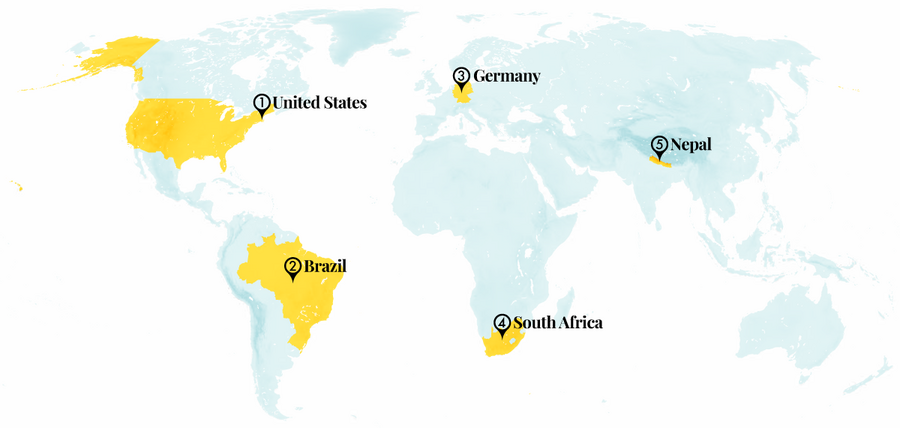
Other headline stories we’re watching
(Get live updates throughout the day.)The Monitor's View
Mercy’s role against human smuggling
- Quick Read
- Deep Read ( 2 Min. )
-
By the Monitor's Editorial Board
A courtroom exchange on Tuesday in the West African nation of Senegal drew out what may be a key to resolving one of the most pernicious aspects of mass migration. Under vigorous questioning from the judge, a defendant acknowledged his role in transporting people illegally. Then he asked for “everyone’s forgiveness.”
The scale of human smuggling around the world is hard to quantify. The global population of migrants nears 300 million, according to the United Nations. Much of that movement crosses the Mediterranean Sea. At one point, as many as 90% of people reaching Europe irregularly from Africa moved through criminal networks.
In Senegal, a succession of tragedies off the coast involving capsized vessels overcrowded with migrants has prompted a new government to crack down on criminal operations. Arrests have soared, resulting in the prosecution of 210 smugglers so far this year.
The trial in Senegal may offer a new approach. When the defendant sought forgiveness based on contrition, he evoked a concept of justice rooted in redemption. “A remorseful apology can contribute to a vocabulary of forgiveness in the context of evil,” wrote Pumla Gobodo-Madikizela, a psychology professor at Stellenbosch University in South Africa.
Mercy’s role against human smuggling

A courtroom exchange on Tuesday in the West African nation of Senegal drew out what may be a key to resolving one of the most pernicious aspects of mass migration. Under vigorous questioning from the judge, a defendant acknowledged his role in transporting people illegally. Then he asked for “everyone’s forgiveness.”
The scale of human smuggling around the world is hard to quantify. The global population of migrants nears 300 million, according to the United Nations. Much of that movement crosses the Mediterranean Sea. At one point, as many as 90% of people reaching Europe irregularly from Africa moved through criminal networks, generating billions of dollars in illicit commerce.
Europe has tried a range of strategies to curb the flow. In its latest move, the European Union launched a new network Wednesday to coordinate efforts among its 27 member states to counter drug trafficking, money laundering, and people smuggling.
The last issue has become a focal point of cooperation among governments in North Africa. The region is a key point of departure for people fleeing poverty, conflict, and the effects of climate change. So far this year, the U.N. reports, roughly 47,000 people have reached Italy alone by sea.
In Senegal, a succession of tragedies off the coast involving capsized vessels overcrowded with migrants has prompted a new government to crack down on criminal operations. Arrests have soared, resulting in the prosecution of 210 smugglers so far this year, Le Monde reported.
For countries on the receiving end of mass migration, addressing the root causes for why people leave their homes may be out of reach. Tunisia, for example, has little ability to shape events in Sudan or the Democratic Republic of Congo, where wars are displacing millions.
In South Africa, the police force in Johannesburg has found that compassion is an essential tool in countering migrant smuggling. A “victim-centered approach” that involves society in caring for targets of such crimes, “builds a relationship of trust that would be critical ... in the investigation meant to bring the criminals to justice,” a U.N. report observed last year.
The trial in Senegal’s seaside port of Mbour may have given that approach a new dimension. When the defendant Cheikh Sow sought forgiveness based on contrition, he evoked a distinctly African concept of justice rooted in redemption.
“A remorseful apology can contribute to a vocabulary of forgiveness in the context of evil,” wrote Pumla Gobodo-Madikizela, a psychology professor at Stellenbosch University in South Africa. Her research on post-apartheid healing underscores the enabling effect of empathy. “Genuine remorse humanizes perpetrators and transforms their evil from the unforgivable into something that can be forgiven.”
Mr. Sow’s case has yet to be decided. Yet his remorse may encourage a view of justice in Senegal that finds a solution to migration and the criminality that exploits it in the recognition and restoration of individual integrity.

A Christian Science Perspective
Each weekday, the Monitor includes one clearly labeled religious article offering spiritual insight on contemporary issues, including the news. The publication – in its various forms – is produced for anyone who cares about the progress of the human endeavor around the world and seeks news reported with compassion, intelligence, and an essentially constructive lens. For many, that caring has religious roots. For many, it does not. The Monitor has always embraced both audiences. The Monitor is owned by a church – The First Church of Christ, Scientist, in Boston – whose founder was concerned with both the state of the world and the quality of available news.
‘Don’t connect the dots’
- Quick Read
- Read or Listen ( 4 Min. )
-
By Sue A. Spotts
In yielding to God, good, as the only true cause of existence, we’re able to assert our freedom from whatever type of inharmony would claim to have power, and to experience healing.
‘Don’t connect the dots’
Some years ago I was struggling with a painful condition in my legs that was making it difficult to find a comfortable position either to rest or to sit and work. I phoned a fellow Christian Scientist to discuss the situation and perhaps gain some fresh, healing spiritual insights.
In the course of our conversation I mentioned a recent series of events that I found disturbing, suggesting that perhaps this was connected to the physical distress. My friend’s response redirected my thought process entirely.
He said simply, “Don’t connect the dots. They aren’t inherently connected, so don’t do it for them.”
In that moment I mentally flashed back to those coloring books many of us had as children. Dragging a pencil along from one numbered dot to the next, the outline of some farm animal or cartoon character or decorative object would become apparent.
What struck me so profoundly about the analogy was the fact that the dots are inert, mindless, incapable of connecting themselves to one another. Likewise, Christian Science makes clear that a physical symptom, having no intelligence of its own, cannot relate itself either to another symptom or to disease; nor do stress and anxiety have power to cause a physical difficulty.
I began to see more the mental nature of these seeming connections, and to understand better how it was that I could decline to participate in mentally outlining a “picture” of illness and incapacity. I felt God’s healing Christ message saying to me, “You decide. Your heavenly Father, omnipotent Spirit, gives you divine authority to honor Him as the only real cause – to declare His supremacy right now, and to deny causation to matter, to mortal mind, and to material so-called laws. You can decline to attribute power to that which has in reality no power.”
I began to feel considerably less distressed about the various factors that had been concerning me as possible causes of the condition. Even if those factors continued to be present for a time, I reasoned, they were not causative; they were not of themselves capable of producing or aggravating disease.
Throughout that day and into the next, when the suggestion presented itself that some physical or emotional factor might be causing the problem, I felt bolstered by divine inspiration to withhold my consent. Looking back now, I would say, denying that the difficulty had a legitimate cause took the ground out from under it, so to speak.
The physical discomfort and accompanying symptoms completely dissolved over the course of two days.
The utterly spiritual premise of Christian Science is that God is the one absolute, almighty, infinitely good cause. Based on the Bible’s inspired message, the discoverer of Christian Science, Mary Baker Eddy, describes God in her writings as omnipotent, omnipresent, and omniscient. These terms open up to us the spiritual sense of God as all-powerful good, all-present divine Life and Love, and all-knowing divine intelligence.
God – divine, infinite Spirit – does not share His power either with matter or with a so-called mortal mind. Nor do these exist as lesser powers that can somehow encroach on His creation and undermine the health and harmony of His children.
Simply put, God is the only Mind, and this Mind exists to the exclusion of any other cause, substance, power, presence, or mind. Each one of us, as the offspring of God, is the outcome of this infinitely good cause. This means that our true being is spiritual, functioning solely within the divine Mind. Everything about us as Mind’s spiritual expression is benign, useful, harmonious, responsive to the beneficent law of Life, Truth, and Love.
What is required of us when we are seeking healing isn’t complex. It’s to be childlike, as Christ Jesus commanded, and listen with an open heart for the message of the healing Christ, Truth, the true idea of God and man that Jesus wholly embraced and showed forth in his healing work. Fear, sin, and discord recede from the consciousness that is giving its allegiance to divine Truth; and they are ultimately banished, as God-given spiritual realization takes hold and grows in our thought.
“The scientific statement of being” in the Christian Science textbook is unequivocal on this point: “All is infinite Mind and its infinite manifestation, for God is All-in-all” (Mary Baker Eddy, “Science and Health with Key to the Scriptures,” p. 468). Within the allness of divine Mind and its infinite manifestation, there are literally no dots of material cause and effect to connect!
Through prayer we see our way clear to stop lending validation to some problem. We are given of God the grace and conviction to honor Him as the singular cause and condition of our being. Then we find that the spiritual light we so need is actually right at hand. And we enter naturally into the sacred experience of Christian healing.
Adapted from an article published in the Feb. 18, 2019, issue of the Christian Science Sentinel.

Viewfinder
Devastation and imagination

A look ahead
Thanks for exploring with us today. For tomorrow, we’re working on a lineup that includes a pair of features with a Friday feel: Ken Makin reviews “The Wild Robot,” a new animated film based on the bestselling children’s picture book. And Ann Scott Tyson joins Asia Editor Lindsey McGinnis on our “Why We Wrote This” podcast to talk about gathering (including by bicycle) some oft-ignored perspectives from Taiwan.



